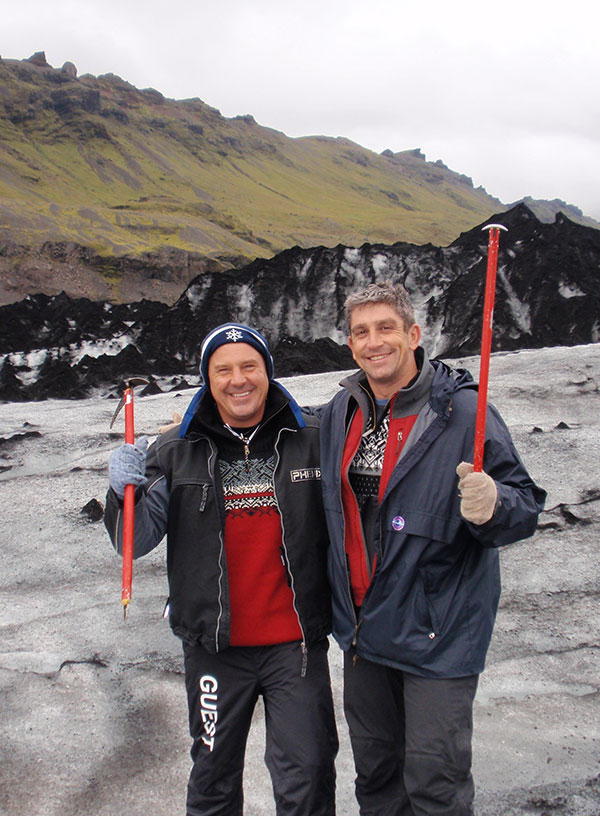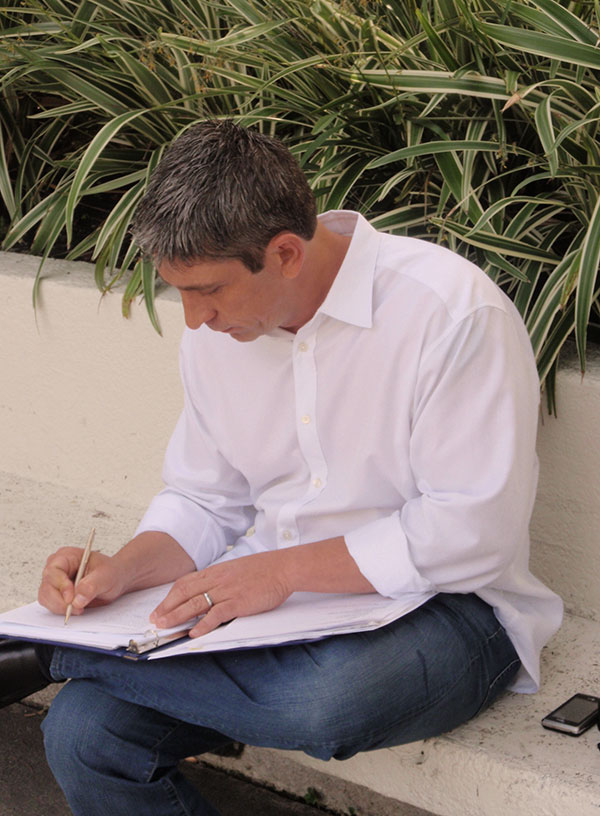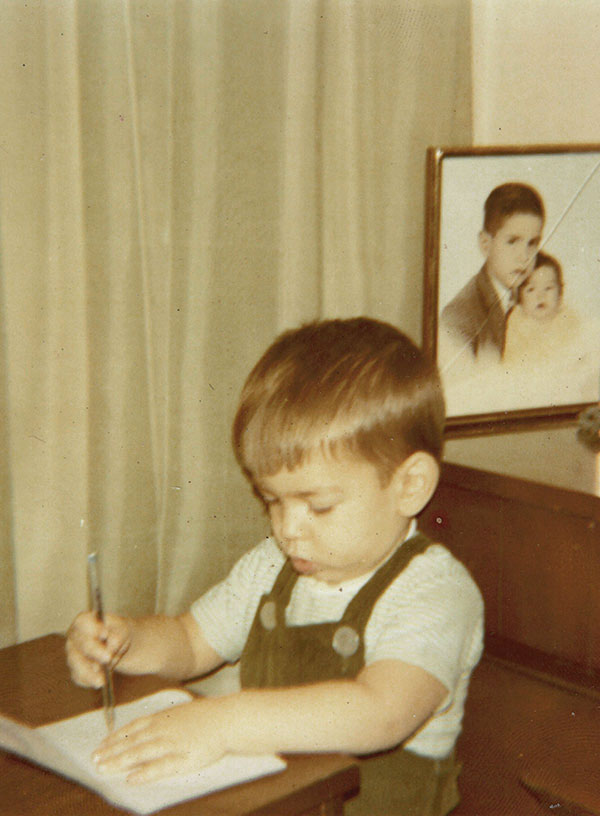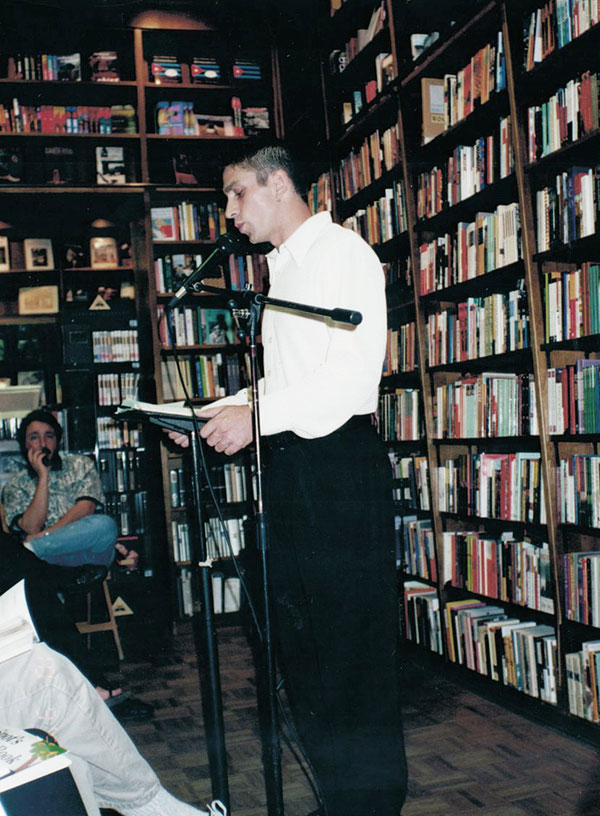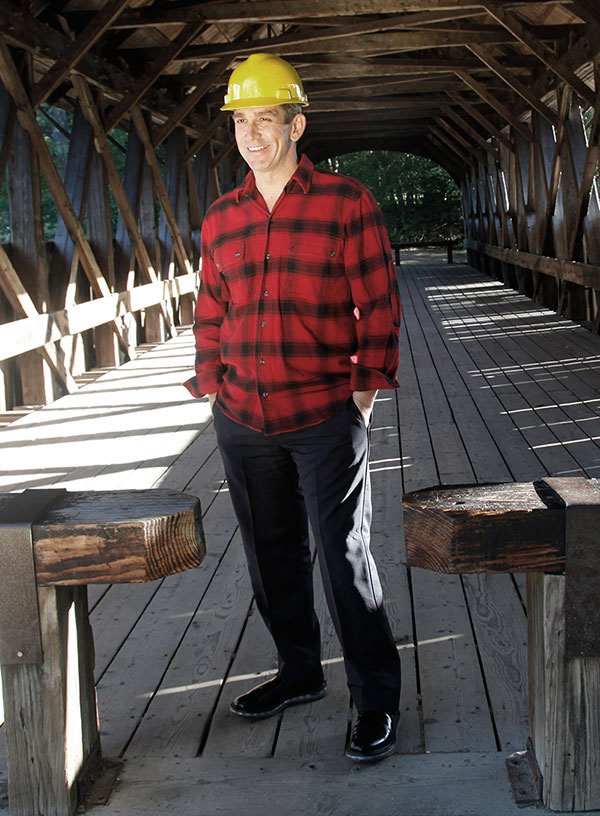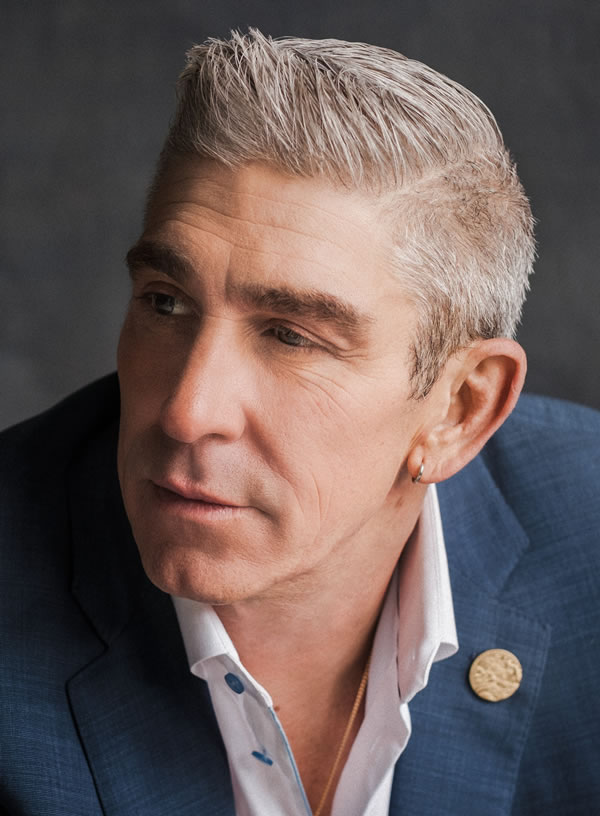Bio Note
Selected by President Obama as the fifth Presidential Inaugural Poet in U.S. history, Richard Blanco was the youngest, the first Latinx, immigrant, and gay person to serve in that role. In 2023, Blanco was awarded the National Humanities Medal by President Biden from the National Endowment for the Humanities. Born in Madrid to Cuban exile parents and raised in Miami in a working-class family, Blanco’s personal negotiation of cultural identity and the universal themes of place and belonging characterize Blanco’s many collections of poetry, including his most recent, Homeland of My Body, which reassess traditional notions of home as strictly a geographical, tangible place that merely exist outside us, but rather, within us. He has also authored the memoirs FOR ALL OF US, ONE TODAY: AN INAUGURAL POET’S JOURNEY and THE PRINCE OF LOS COCUYOS: A MIAMI CHILDHOOD. Blanco has received numerous awards, including the Agnes Starrett Poetry Prize, the PEN American Beyond Margins Award, the Patterson Prize, and a Lambda Prize for memoir. He was Woodrow Wilson Fellow and has received numerous honorary degrees. Currently, he serves as Education Ambassador for The Academy of American Poets and is an Associate Professor at Florida International University. In April 2022, Blanco was appointed the first-ever Poet Laureate of Miami-Dade County.
Bio
Selected by President Obama as the fifth Presidential Inaugural Poet in U.S. history, Richard Blanco was the youngest, the first Latinx, immigrant, and gay person to serve in that a role. In 2023, he was awarded the National Humanities Medal from the NEH by President Biden. Blanco was a Woodrow Wilson Fellow and has received numerous honorary doctorates. He currently severs as the first-ever Education Ambassador for the Academy of American and was appointed the first-ever poet laureate of Miami Dade County. Blanco has taught at Georgetown University, American University, and Wesleyan University. He is currently an Associate Professor of English at Florida International University, his alma mater, where he earned both a Bachelor of Science in Civil Engineering and a Master of Fine Arts in Creative Writing.
Born in Madrid to Cuban exile parents and raised in Miami in a working-class family, Blanco’s personal negotiation of cultural identity and the universal themes of place and belonging characterize his five collections of poetry: City of a Hundred Fires (recipient of the Agnes Starrett Poetry Prize from the University of Pittsburgh Press; Directions to The Beach of the Dead (recipient of the Beyond Margins Award from the PEN American Center); Looking for The Gulf Motel (recipient of the Paterson Poetry Prize and the Thom Gunn Award); How To Love a Country, his most recent book, Homeland of My Body: New & Selected Poems. Blanco has also authored the memoirs For All of Us, One Today: An Inaugural Poet’s Journey and The Prince of Los Cocuyos: A Miami Childhood, which is currently under development as a TV series. Exploring other genres, with Vanessa Garcia, Blanco cowrote the play Sweet Goats & Blueberry Señoritas, which premiered at Portland Stage. He is also co-lyrist for Waiting for Snow in Havana, a musical in development.
As a civically engaged author, Blanco has written occasional poems for organizations and events including the reopening of the US Embassy in Cuba, Freedom to Marry, the Tech Awards of Silicon Valley, and the Boston Strong benefit concert following the Boston Marathon bombings. Nationally as well as internationally, Blanco lends his art and voice to advocate for diversity, LGBTQ rights, immigration rights, and arts education. Whether speaking as the Cuban Blanco or the American Richard, the homebody or the world traveler, the shy boy or the openly gay man, the engineer or the presidential inaugural poet, Blanco’s writings possess a story-rich quality that illuminates the human spirit. His work asks those universal questions we all ask ourselves on our own journeys: Where am I from? Where do I belong? Who am I in this world?
More About My Story: Made in Cuba, assembled in Spain, imported to the USA
It’s said that every poet is writing one poem all their life. Figuratively speaking, this means that a poet’s body of work keeps circling around some kind of central obsession. My obsession comes down to one word—home—and all that big word calls to mind with respect to family, community, cultural identity, sexuality, and much more. It’s an obsession that began before I was even born. Let me explain. As I like to say, I was made in Cuba, assembled in Spain, and imported to the United States—meaning my mother, seven months pregnant with me, and the rest of my family arrived as exiles from Cuba to Madrid, where I was born. Less than two months later, we emigrated once more to New York City. Only a few weeks old, I already belonged to three countries, a foreshadowing of the concerns of place and belonging that would shape my life and work. Eventually, we settled in Miami, where I was raised and educated. Growing up among close-knit Cuban exiles instilled in him a strong sense of community, dignity, and identity that I’d carry into my adult life as a writer.
Though possessed by a strong creative spirit since childhood, I also excelled in math and the sciences. As such, my parents encouraged me to study civil engineering, believing it would ensure a more stable and rewarding career for me. I took their advice, earning a degree from Florida International University in 1991, and began working as a consulting civil engineer in Miami. In my mid-20s I was compelled to express my creative side through writing, prompted by questions about cultural identity and my personal history. I returned to Florida International University, where I was mentored by the poet Campbell McGrath, and earned a Master of Fine Arts in creative writing in 1997.
My first book of poetry, City of a Hundred Fires, was published in 1998, winning the Agnes Lynch Starrett Poetry Prize from the University of Pittsburgh Press. In the collection, I explore my cultural yearnings and contradictions as a Cuban-American and captured the details of my transformational first trip to Cuba, my figurative homeland. After the success of my first book, I took a hiatus from my engineering career and accepted a position at Central Connecticut State University as a professor of creative writing. While living in Connecticut, I met my current life-partner, Dr. Mark Neveu, a research scientist.
Driven by my desire to examine the essence of place and belonging, I traveled extensively through Spain, Italy, France, Guatemala, Brazil, Cuba, and New England. Eventually, in 2002, Mark and I moved to Washington, DC, where I taught at Georgetown and American universities, The Writers Center, and the Arlington County Detention Facility. Poems relating to my journeys comprise my second book of poems, Directions to The Beach of the Dead (2005), which received the Beyond Margins Award from the PEN American Center for my explorations of the ideal of home and the connections sought through place, culture, family, and love.
In 2004, I returned to Miami and resumed my engineering career. Engineer by day, I designed several town revitalization projects; poet by night, I began working on another collection before moving once again, this time to Bethel, Maine, where I sought the peace and tranquility of nature. While in Maine, I completed my third book of poetry, Looking for The Gulf Motel (2012), which related the complex intersection of my culture and sexuality, which I term cultural sexuality. I drew a parallel between my longing for a geographical home, as a Cuban-American, and my longing, as a queer child and adult, for a psychological home in the sense of safe space. The collection received the Paterson Poetry Prize, the 2012 Maine Literary Award for Poetry, and the Thom Gunn Award.
In 2012, President Barack Obama selected me to serve as the fifth presidential inaugural poet in U.S. history, humbly following in the footsteps of such luminary poets as Robert Frost and Maya Angelou. I was the youngest, first Latino, immigrant, and gay person to serve in that role, reading “One Today,” an original poem I wrote for the occasion, at Obama’s inauguration ceremony in January 2013. A children’s book version of my presidential inaugural poem, One Today, in collaboration with renowned illustrator Dav Pilkey, was released in 2015. In my first prose publication, For All of Us, One Today: An Inaugural Poet’s Journey (2013), I shared the emotional details of my experiences as inaugural poet and reflected on my understanding of what it means to be an American.
Following my creative interests and wanting to further develop the themes, topics, and intersections of my poetry, I authored the memoir, The Prince of Los Cocuyos: A Miami Childhood (2014). Through this genre I was able to more fully render my coming-of-age story and my desire to find my place in America while grappling with my burgeoning artistic and sexual identities. The book received the Lambda Literary Award for Gay Memoir and a Maine Literary Award. Currently, the memoir is in development for a television. As a co-executive producer and writer of the series, I am excited by the opportunity to engage a mass audience and convey this important, yet underrepresented, American story of immigration, sexuality, and identity.
In 2017, a collaboration with photographer Jacob Hessler resulted in the fine-press book, Boundaries, which features my poems paired with Hessler’s photographs. Together, we investigated the boundaries of race, gender, class, and ethnicity, among many others; and challenged the physical, imagined, and psychological dividing lines—both historic and current—that shadow the United States. In my next collection, How to Love a Country (Beacon Press, 2019), I continued to invite a conversation with all Americans. I wanted to dig deep into the very marrow of our nation, interrogating our past and present, grieving our injustices, and noting our flaws. But I also wanted to celebrate our ideals and cling to our hope that America could and ought someday to be a country where all narratives converge into one—a country we can all be proud to love and where we can all truly thrive.
Through my desire to explore the public role of poetry—writ large—I’ve evolved into the more inclusive, socially conscious, and politically engaged poet that I am today. Part of that evolution involved writing numerous occasional poems, including the following: “Boston Strong” to address the emotional wounds of Boston Marathon bombings; “Until We Could” to support Freedom To Marry, an organization at the forefront of marriage equality; “Matters of the Sea,” written for and recited at the reopening of the US Embassy in Cuba; and “The U.S. of Us, ” commissioned by USA Today to affirm Hispanics’ historical and cultural importance after the El Paso shootings. Writing these poems solidified my commitment to community engagement and my self-view as a poet of the people, the view I share with poet Roque Dalton who asserted that “…poetry, like bread, is for everyone.” In this same regard, I chose to serve as Education Ambassador for the Academy of American Poets, and as the first-ever poet laureate of Miami Dade County.
I’ve continued to explore themes of home and belonging through various other genres and projects such as Sweet Goats & Blueberry Señoritas, a play (co-authored with Venessa Garcia) which premiered at Portland Stage and is currently scheduled for a second production in Miami in 2023. The main character, Beatriz, a Cuban-American baker in Maine, tries to figure out whether she should stay with the community she’s developed in her rural town, or reunite with her estranged mother in Miami. I am also currently a co-lyricist on a musical in progress, Waiting for Snow in Havana, based on the 2003 National Book Award winning memoir about Operation Peter Pan, a clandestine exodus of over 14,000 unaccompanied Cuban minors to the United States.
In my most recent poetry volume, Homeland of My Body, I again engage with the thematic question of home, but in a new context. During the COVID-19 pandemic I began to reevaluate prescribed definitions of home, given how those constructs were ruptured and we were no longer able to connect with the various communities that supported our sense of place. These circumstances caused me to reassess traditional notions of home as strictly a geographical, tangible place, resulting in new poems that suggest home does not merely exist outside us, but within us, within our mortal bodies, ultimately. We never gain or lose any home. They all exist in unison in the cellular memory that retains the sum total of our sensory experiences of place and belonging. As a whole, this volume provides a retrospective of how I came to the emotional conclusion that my body and my art are my current respite and psychological home.
I live by the adage that good art answers questions, but great art keeps asking them. In this regard, I continue challenging myself to explore new dimensions of the meaning of home Whether speaking as the Cuban Ricardo or the American Richard, the homebody or the world traveler, the shy boy or the openly gay man, the engineer or the presidential inaugural poet, I strive to create story-rich works that illuminates the human spirit. I’m driven by the belief that the questions I ask myself are the same universal questions we all ask ourselves on our own journeys: Where am I from? Where do I belong? Who am I in this world?

